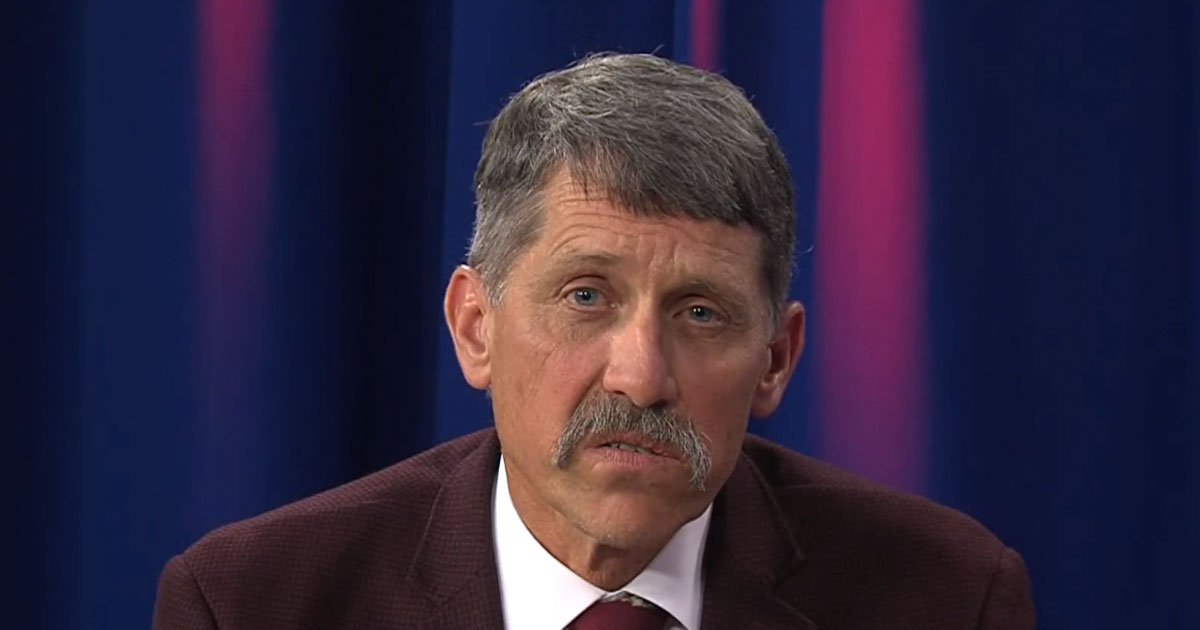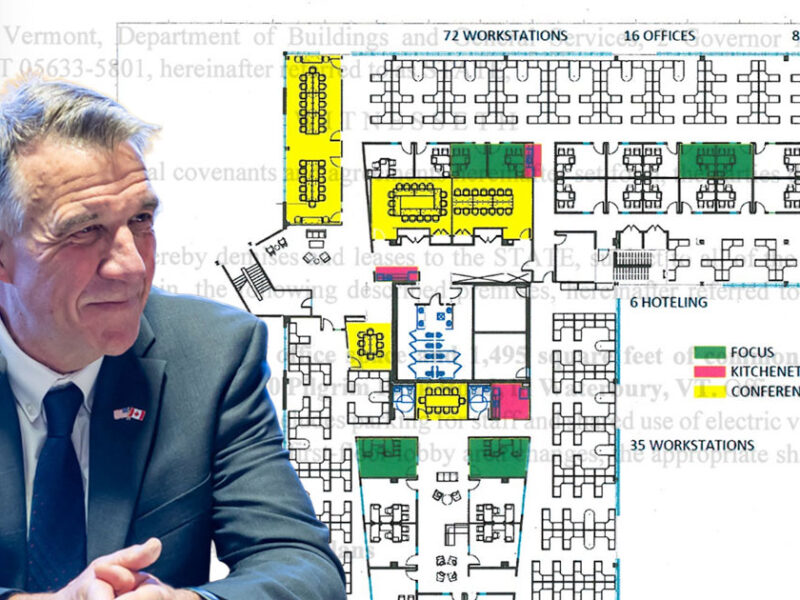Lieutenant Governor John Rodgers has been a familiar face in Vermont politics over the last two decades. He served in the Vermont House of Representatives from 2003 to 2011 and in the Vermont Senate from 2013 to 2021. A former Democrat, Rodgers changed party affiliations in 2024 to run for higher office as a Republican. While the position of Lieutenant Governor has little power, it has often been used by politicians seeking higher office.
Against the backdrop of Donald Trump’s openly transphobic and xenophobic national campaign, Rodgers, a self-professed social libertarian who is anti-Trump, embraced local far-right Republicans, a strategy that led to his campaign victory.
While he professes to be in the Phil Scott mold as a moderate, anti-Trump Republican, and holds up a single, 15-year-old vote in support of gay marriage to justify that he’s not in alliance with Vermont’s conspiratorial and bigoted far right, Rodgers’ actions throughout his political and personal life show that this rightward shift was not only a means to ascend to higher office, but an avenue for which he could find a welcome embrace for his dog-whistle laden grievances of recent years.
John Rodgers: The Most Aggrieved Politician and Victim, According to John Rodgers
Rodgers often portrays himself as the heroic victim in his own stories, employing personal insults whenever someone disagrees with him. By his account, he didn’t leave the Democrats because he became more politically conservative: they left him. Or perhaps he left the party because they allegedly discriminated against him.
It’s not just his fellow legislators he makes these claims against. Rodgers has developed a penchant for claiming he’s being discriminated against by nearly everyone who challenges him, with a wide range of incidents in recent years. As a state senator, his rightward shift started years before his official switch, claiming victimization from a litany of racist, sexist, and homophobic accusations lobbed at him. He did this all while using specific language around “rural culture,” which is often interpreted as a dog whistle for the far right and white supremacists.
A sampling of Rodgers’ public outbursts and squabbles includes:
- Allegedly calling a road crew member in his hometown of Glover “a moron” and town officials “lowlifes” in his quest to privatize and close a publicly used road next to his property.
- Claiming that attempts by the Vermont Fish and Wildlife Board to increase member diversity were discriminatory against Rodgers himself, and that the policy was founded in “bigotry, classism, and discrimination,” which hurt “unprivileged” hunters like himself. In an interview with the Rake, Rodgers defended these comments, claiming that those who pushed the bill were bigoted against him, and that they have “bias against the culture that I grew up with.”
- Rodgers also claimed discrimination against him for being “internet connection challenged” because he was tending to his businesses instead of legislative meetings when Covid first hit Vermont, calling senators who questioned his absences a “snippy little bitch” over email. After receiving swift backlash, Rodgers offered apology, denying his words were sexist and homophobic, and cited his 2009 vote in support of gay marriage as proof of his non-homophobia. Rodgers would later complain that the “angry email” Senate President Tim Ashe sent in response to his outburst was “just as offensive and bad as using derogatory names,” thereby admitting his words were offensive and derogatory, but claiming he was the real victim and was owed an apology.
- After introducing legislation to ban cellphone use for people under the age of 21, Rodgers received an email from a critic who claimed he was wasting legislative resources and was a “Republican in disguise” (four years before he won statewide office as a Republican). In his response, Rodgers called him a “clueless fuck.”
- On an episode of the podcast Rumblestrip, Rodgers went on a rant about a disrespectful comment he saw on a WCAX post, in which someone wrote that children hunting turkeys were “future murderers in training.” In contrast, Rodgers has never spoken out publicly against the exuberant and increasing transphobic, homophobic, and anti-immigrant comments his allies, other Republican party members, or even just WCAX readers have made.
When it comes to self-reflection or personal responsibility, Rodgers often comes across as another belligerent far-right politician. While these instances paint a picture of Rodgers’ inability to look inward or take accountability for his actions, they also demonstrate a pattern suggesting the only real discrimination that exists is against rural, white Vermonters, who, in Rodgers’ mind, and the minds of the far right, are losing their “culture” and way of life. BIPOC and LGBTQ+ Vermonters are seemingly just faking it.
This was demonstrated clearly in Rodgers’ behavior toward former state senator Kiah Morris in 2018. Morris, who is Black, accused Rodgers on Twitter of using racially charged dog-whistles when he compared colleagues who were newer to Vermont to insects overwhelming the state. Using dehumanizing language through comparisons with animals is nothing new: before and during the Holocaust, Jewish people were called vermin, and in Rwanda, right before the genocide, Tutsi were called cockroaches. Rodgers could have used this as an opportunity to learn and grow, and reflect on his unthoughtful language choices. Instead, Rodgers claimed anyone who found his words offensive was engaging in “observation bias” and refused to have a conversation, calling Morris’ charges “utter bullshit.”
Later, in an interview with the now-defunct far-right blog True North Reports, Rodgers said, “I went and confronted her and told her that she was racist, and that putting out the tweet that she did was racist.” Rodgers went on to disparage Morris’s integrity, without a hint of irony or self-reflection, saying she wasted taxpayer dollars asking for investigations into claims of harassment and stalking. Rodgers would also make more disparaging claims about Morris, claiming that, “I guess that’s the only game she has. I think she’s dishonest, and I think she does things just for media attention.”
An independent investigation, along with the Vermont Human Rights Commission, found clear racially motivated bias from the Bennington Police and the Town of Bennington against Morris and her husband. Max Misch, a proud white supremacist originally from Queens, NY, had been harassing and stalking Morris for years, often while holding guns in a threatening manner. Bennington Police could have legally taken away Misch’s guns while charges played out, but chose not to. The city of Bennington eventually settled for $137,000 and issued a public apology.
Despite clear evidence to the contrary, Rodgers also claimed at the time that then Attorney General T.J. Donovan found no death threats during his investigation.
Even though Rodgers would be proven wrong again and again and again and again, he never apologized to Morris for his inflammatory accusations. While he could have made amends and sided with one of the few Black state senators who had faced racist harassment and threats, he chose to downplay very real and visible racially motivated violence. In an interview with the Rake, Rodgers pointed out he is capable of changing the language he uses after learning the term “black market” had racist connotations. Rodgers also said that he could not be bothered to keep up with the Misch case, even while it received national media attention. He has not spoken to Morris since those tweets and stands by the false and racially tinged accusations he made.
Why Rodgers Really Lost His House Seat
Rodgers likes to cite his 2009 vote in support of gay marriage as the sole reason he was voted out of office as a state representative, believing his own constituency was just that homophobic. Not that he was the victim of changing demographics, his own politics shifting rightward, or his grating political style. In an op-ed in the Vermont Daily Chronicle, a far-right, openly transphobic online blog (where editor Guy Page personally encouraged Vermonters to leave the state to avoid “Transgender/DEI education”), Rodgers claimed, “I have always supported women’s rights and everyone’s right to bodily autonomy…While serving in the House of Representatives, I was the only member of the legislature who lost my seat because I supported marriage equality.” Is this true, or another delusion of victimization?
Rodgers’ argument that he was too socially liberal for his community and was “punished” for their internalized homophobia just doesn’t hold water for many reasons. Vermont had changed quickly since 2000, when a hotly contested gay civil union bill passed by only 11 votes in the House, 79-68. The homophobic and xenophobic reaction, the “Take Back Vermont” movement, led to 16 incumbent politicians, including nearly every Republican who voted for civil unions, losing their seats. Yet in 2009, gay marriage passed by over 40 votes, 95-52, and Governor Douglas’s veto only bolstered representatives’ resolve, as the override vote margin grew to 50, tallying 100-49 votes.
If Rodgers’ district were homophobic, they would have responded negatively to his 2005 and 2007 votes, where Democrats overcame another Governor Douglas veto to include gender identity as a protected class. While the far right wrote angry op-eds and mobilized against the vote, they didn’t vote conservative Democrats out of office in 2006 or 2008, and in fact, their margins grew during these years.
Neither of Rodgers’ 2010 opponents ran against gay marriage, and there is no evidence that it was part of anyone’s campaign strategy. When a Republican state representative from Barton chose not to run for re-election, the district became open for challengers. Vicki Strong, his Republican opponent, focused on taxes and smaller government. Sam Young, another Democrat who supported civil unions during his 2008 independent gubernatorial run, also ran for the open seat.
In that election, Rodgers lost to Republican Strong by 122 votes, and after a recount, to Young by just three votes. (The district, Orleans-Caledonia 1, elects two Representatives.) Young was younger and more liberal than Rodgers, even supporting some limits on gun ownership in 2018. During that same time, Rodgers, by then a state senator, utilized vague dog whistles about the state being “overpopulated” by new people who do not support ‘rural culture’ to oppose these bills.
After the 2010 election season, Democrats only lost one seat in the House, to an independent third-party candidate. They gained four seats by 2012, while Republicans lost five seats. Unlike 2000, there was no wave or backlash against conservative Democrats voting for gay marriage, and Democrats gained a supermajority. If Rodgers’ gay marriage vote had cost him his seat, why didn’t a second Republican bump Young, who supported gay civil rights?
Rodgers’ 2012 election to the Vermont Senate, in which he came in second place in a district that elects two senators, shows how little water his “sacrificial lamb” argument holds. In that election, Rodgers beat out third place by 3,300 votes. In 2024’s Lieutenant Governor election, Rodgers beat Zuckerman in Rodgers’ old house district by 20 points. If voters were mad at Rodgers, they would not have voted him into a more powerful office in droves. Rodgers lost his House seat because he was a very conservative Democrat in a district that had voted for a conservative Republican and a liberal Democrat, and nothing in between. It’s a message he eventually learned when he switched parties to run for Lieutenant Governor as a “moderate anti-Trump Republican.”
Rogers Courted, Then Jilted Vermont’s Far Right
While Rodgers’ inaccurate gay marriage backlash narrative is a way of appealing to centrists and liberals, during his Lieutenant Governor campaign, when his national counterparts in the Republican Party increased their attacks against queer people and immigrants, Rodgers stayed quiet. Instead, he focused his campaign on the economic and cultural grievances of white, rural Vermonters. The state’s far right took notice, as Rodgers attracted endorsements from far-right conspiracy theorists. Rodgers’ rhetoric of perpetual victim of liberal and progressive wokeness found purchase in Vermont’s far-right circles. The language he used is so similar to the far right that many of these people felt betrayed when he spoke out against supporting Trump’s economic policies.
While Rodgers voted to legalize gay marriage 15 years ago, his politics since then have morphed into dog whistles, personal defensiveness, and lamenting the “death of rural culture,” all while refusing to learn the racially charged history this language holds as he welcomes the embrace of the conspiratorial far right. It’s a talking point that currently holds little water, as LGBTQ+ people face increased concerns for their safety, and Rodgers is nowhere to be found in support of Vermont’s LGBTQ+ residents. Rodgers told the Rake that not only did he not attend a pride parade in the last year, but he also admitted to never attending one in his life, including in his 20+ years as a Vermont politician.
In what is an apt description of the differing priorities of Rodgers and his predecessor, David Zuckerman, Rodgers told the openly transphobic Vermont Daily Chronicle that he planned to replace a poster of banned trans books with “somethin’ dead,” to the publication’s delight.
The John Klar Endorsement
To attain the office of Lieutenant Governor, Rodgers realized his only chance was as a Phil Scott-esque “moderate Republican.” He switched political parties and began lining up endorsements from Republicans. He received several high-profile endorsements, including ones from Governor Scott, former Governor Douglas, and even former Democratic Governor Peter Shumlin. Yet his campaign website did not reflect this bipartisanship, never mentioning the high-profile Douglas or Shumlin endorsements. Instead, it chose to put the endorsement of a failed two-time gubernatorial candidate, John Klar, directly under Governor Scott’s. It wasn’t by mistake.
Having known Klar since Klar moved to Vermont in the 1990s, and bonding over their support of organic farming and food security, Rodgers was happy to use Klar’s reputation as a far-right politician on his way to statewide victory, without any further vetting. He initially stated in an email to the Rake:
I have worked with many people over the years that I strongly disagree with on some subjects. John Klar knows that we do not agree on many issues including DEI, critical race theory, and LGBTQ issues. Despite that he endorsed me because we do agree on healthy organic local food and taking care of the planet. We both agree that growing more organic local food is good Vermonters, good for the environment, and improves food security. If you saw me speak and heard what I had to say, then you understand a little bit about who I am. I’m always willing to speak up about taking care of all Vermonters and will always look for allies wherever I can find them to make that happen.
Rodgers would also tell the Rake that the team wanted Klar’s endorsement for the Republican primary, even knowing that “he was a bit of a lightning rod, and that’s why the endorsement was put up…there’s a lot of his politics that I don’t want to be associated with, but he does have some Republican Party that heed his advice, and we were concerned about getting through the primary.” Rodger’s goal was to bring more “fiscal conservatives” to his campaign, apparently regardless of their social politics.
Klar was the one who reached out to Rodgers, and although he knew that Klar had a Substack with substantial reach among “conservative-leaning” Vermonters, Rodgers and his team apparently never read any of the articles Klar wrote—and Klar wrote a lot of them.
Who is John Klar?
If John Klar is such an important ally to Rodgers, and what looks like the only organic farmer in Vermont who endorses Republican politicians (while supporting RFK Jr. against the “globalists”), then it is worth looking into his politics more. Klar is a right-wing, former born-again Christian whose bigotry and transphobia are rooted in his interpretation of the bible. As a multi-time failed Republican candidate, Klar grew up outside of the state until returning in the late 1990s.
A wealthy former lawyer and farmer, Klar also has a lot of extra time to write. He wrote 100 posts for the Vermont Daily Chronicle in just two years, and wrote nearly 200 more posts from 2021 to 2023 on the shuttered True North Reports, both local far-right websites. He also wrote another 200 blog posts on americanthinker.com, which is a far-right, white nationalist, conspiracy theory-laden blog. While some of his posts focus on far-right conspiracy theories involving food systems, his main focus, obsessively so, is about schools teaching children about gender and sexuality, and trans girls and trans women existing.
Klar has written extensively about his dislike of “gender ideology,” an all-encompassing term of disparagement used by those who seek to impose traditional binary gender roles. He is someone who believes being a white Christian nationalist is a positive political identity and often includes conspiracy theories in his rants. Some of these conspiracies include “the Left” forcing everyone to become vegan, all trans youth are actually just autistic, gender-affirming surgeries are eugenics and the “lobotomy of the 21st century,” the “globalists” are trying to control how food is grown, and the “Demonrat Party” along with climate and “trans cultists” want food prices to rise, wars to rage across the globe, and that they “thirst after their own destruction”:
The potential for a disruption of our food production and distribution system is profound and increasing—and yet we are told to be afraid of white supremacists, Christian nationalists, guns, unproven climate change, not-yet-existent diseases, and misgendering of trans people.
Klar has also taken up the cause for Rodgers locally over the last few years, as Rodgers moved further right. Klar has taken shots at Rodgers’ political opponents and found a way into his good graces. Klar wrote a blog post defending Rodgers’ response to Morris, calling her a racist, claiming the Vermont Racial Equity Task Force is an “overtly communist task force,” and implying that Morris is a “carpetbagging vulture.” He has written posts against Zuckerman, Rodgers’ former political opponent, in which he claimed Zuckerman supports “grooming children with graphic porno novels” and that Zuckerman supported “sexualization of schoolchildren.”
And yet Rodgers not only accepted Klar’s endorsement, even as Klar actively and obsessively worked to undermine the rights and liberties of queer and trans Vermonters, but moved the endorsement to the top of his campaign endorsement page. Rodgers claimed what separates him from Klar is just a civil disagreement on many issues, “including DEI, critical race theory, and LGBTQ issues,” as if Klar is a bigoted uncle living in a small town and not a political figure who writes prolifically to remove queer and trans people’s right to be equal residents. Would Rodgers say that he just had a civil disagreement on a few issues with the KKK or Proud Boys?
Klar’s endorsement of Rodgers follows Rodgers’ same playbook of victimization, but he does so much more explicitly. Rodgers accepted and promoted an endorsement that said that the “far left” are toxic, identity-driven freaks who hate the police and everyone in Vermont and are always calling everyone racist. It’s a good way to build unity with the far right:
I believe it is very important to be welcoming to people like John Rodgers – who have become so disenchanted with their own party that they walkaway. They need a new political and cultural home, not in the toxic, identity-focused divisions and failed policies of the Far Left….We conservatives may not always agree on issues, but let us always be a Party that agrees to be civil and respectful of others, not just within our ranks but toward independent voters and even those progressive legislators with whom we disagree…John Rodgers has repeatedly defended Vermont’s culture from slanderous claims of white supremacy and systemic racism, and against overly-pushy out-of-staters who relocate to Vermont and then condemn its people as racist while exploiting its wonderful resources. I have never heard Phil Scott defend Vermont’s police from false charges of racism – John will.
Rodgers claimed he is “always willing to speak up about taking care of all Vermonters and will always look for allies wherever I can find them to make that happen.” In his Lieutenant Governor campaign, his political ambitions outweighed all else. A small sampling of some of the hateful and bigoted words Klar has published over the years:
- Klar insinuated that all trans women and girls are sexual and violent predators, and even bullied a trans girl and athlete in Randolph, Vermont, falsely claiming that we live in a society where cis girls “are compelled to disrobe in front of biological boys…men who ‘self-identify’ as women ogling inmates in women’s prisons.”
- Klar called the political left in Vermont “America’s Taliban,” that liberal society “demands that fantasy genders and sexual perversions be acknowledged as core to identity, or one is denounced as homophobic.”
- Klar compared homosexuality to pedophilia, saying if one is justified, then the other must be.
- Klar spouted a debunked and harmful conspiracy theory that claims “many youth with autism or other underlying psychological disorders are misdiagnosed as transgender and wrongly administered puberty-blockers or even surgeries” and calls for cutting federal funding until the “perversion” of trans and gender affirming healthcare is outlawed.
- Klar attacked former Vermont state legislator Taylor Small, a drag queen and first trans woman in the statehouse, calling her a “biological man who identifies as a woman” and that she creates “space to groom children in gender pedagogy….[in] faux genders.”
- Lastly, Klar wrote an article attacking a young trans adult who was trying to become a teacher in Vermont.
After the Rake sent several of Klar’s Substack posts, Rodgers sang a different tune. He said that Klar and his followers have “warped what Christian are” and that Klar was “completely out to lunch with what he calls Christian.” Rodgers then said that Klar infringed on people’s freedoms and that while he wouldn’t accept Klar’s endorsement in the future, he would still be willing to work with him around organic farming and “will speak to him as I speak to everyone.”
Rodger’s campaign manager, State Representative Casey Toof, did not respond to requests for comment about the campaign’s relationship with Klar. Elizabeth Brown, who worked on the campaign, said she had “no information on that” when asked, and James Ehlers, who was a campaign advisor and is Rodgers’ current chief of staff, did not respond to questions around vetting endorsements during the campaign.
Springtime for Rodgers in Vermont
When Rodgers’ path to power closed in the Democratic Party, he turned to the Republicans, raising grievances around the perceived loss of power of his fellow white, rural, landowning men. Such rhetoric aligns perfectly with Trump’s base. While he may differ from Trump supporters and occasionally receive their ire, he had no problem courting them, riding their anger to beat his rivals in the Republican primary and eke out a victory over Zuckerman in the general election.
The Lieutenant Governor’s seat is often a springboard for higher office, and Rodgers continues to set his eyes there. Governor Phil Scott’s current term ends in January 2027, at which point he’ll have been in office for a decade. For now, at least, Rodgers is Scott’s heir apparent, should the governor resign or decline to run again. To better understand what Rodgers might do in an actual position of power, it’s worth remembering how he got as far as he has.
Top photo courtesy Town Meeting TV – CC BY 3.0.



